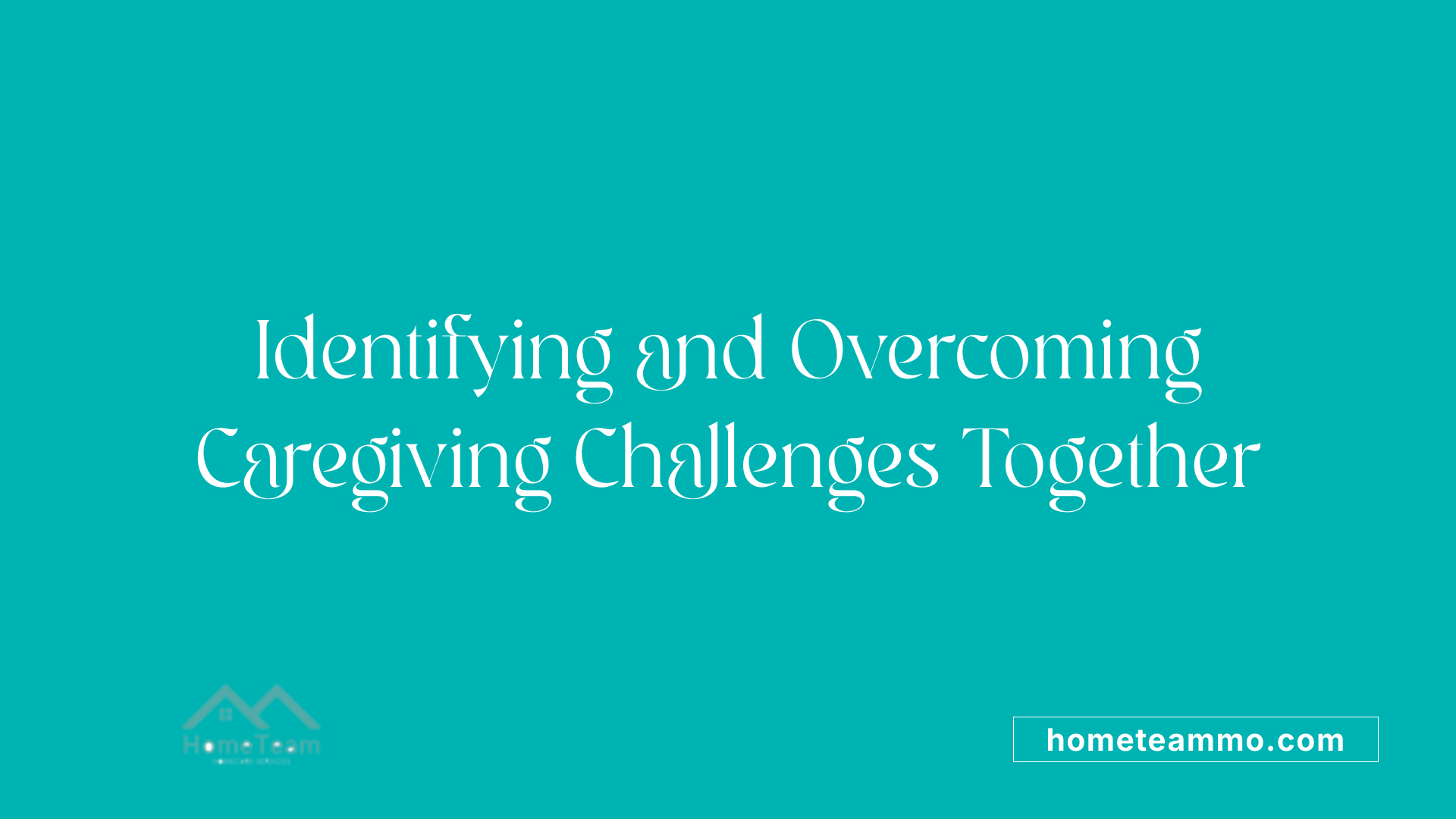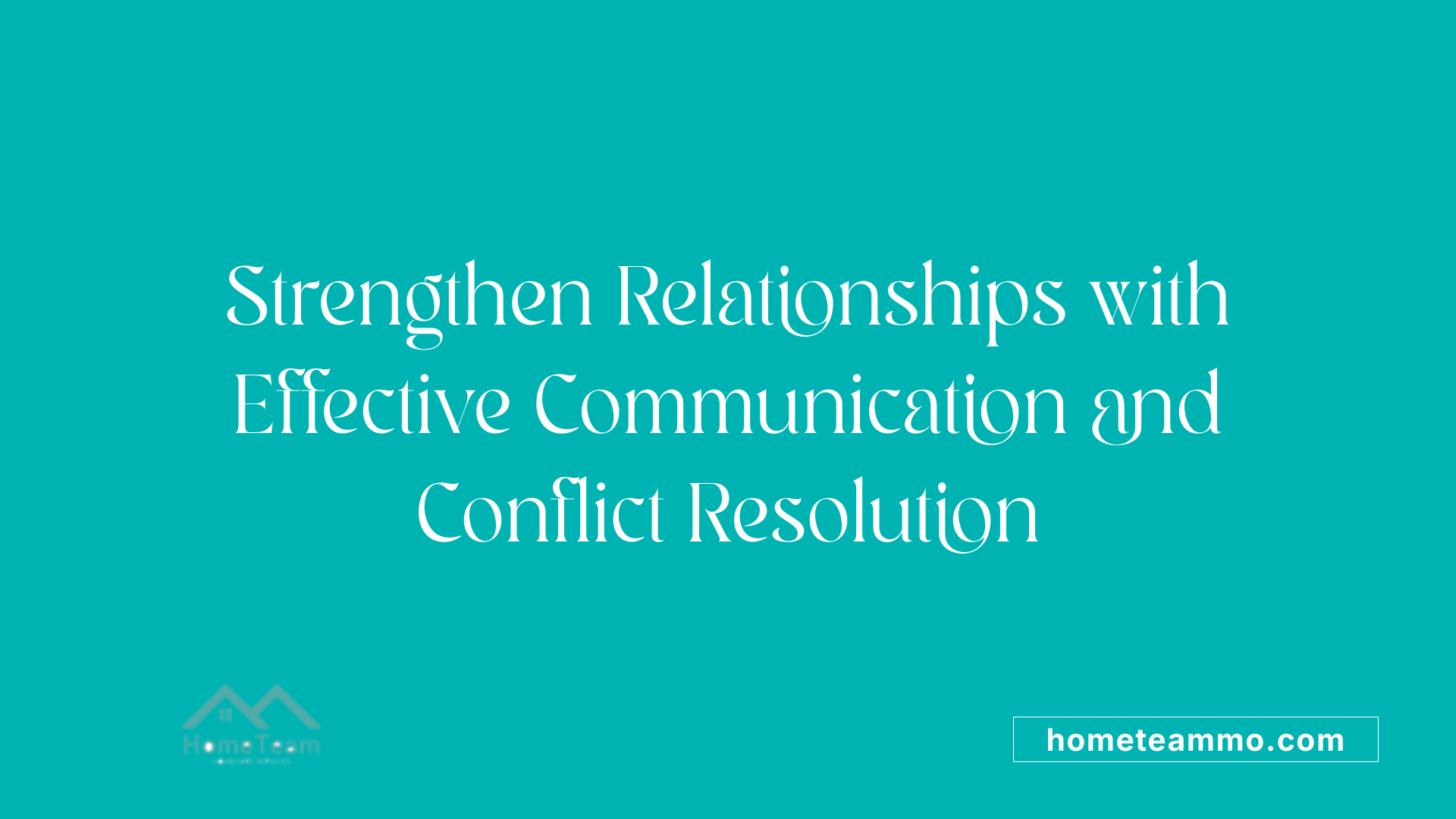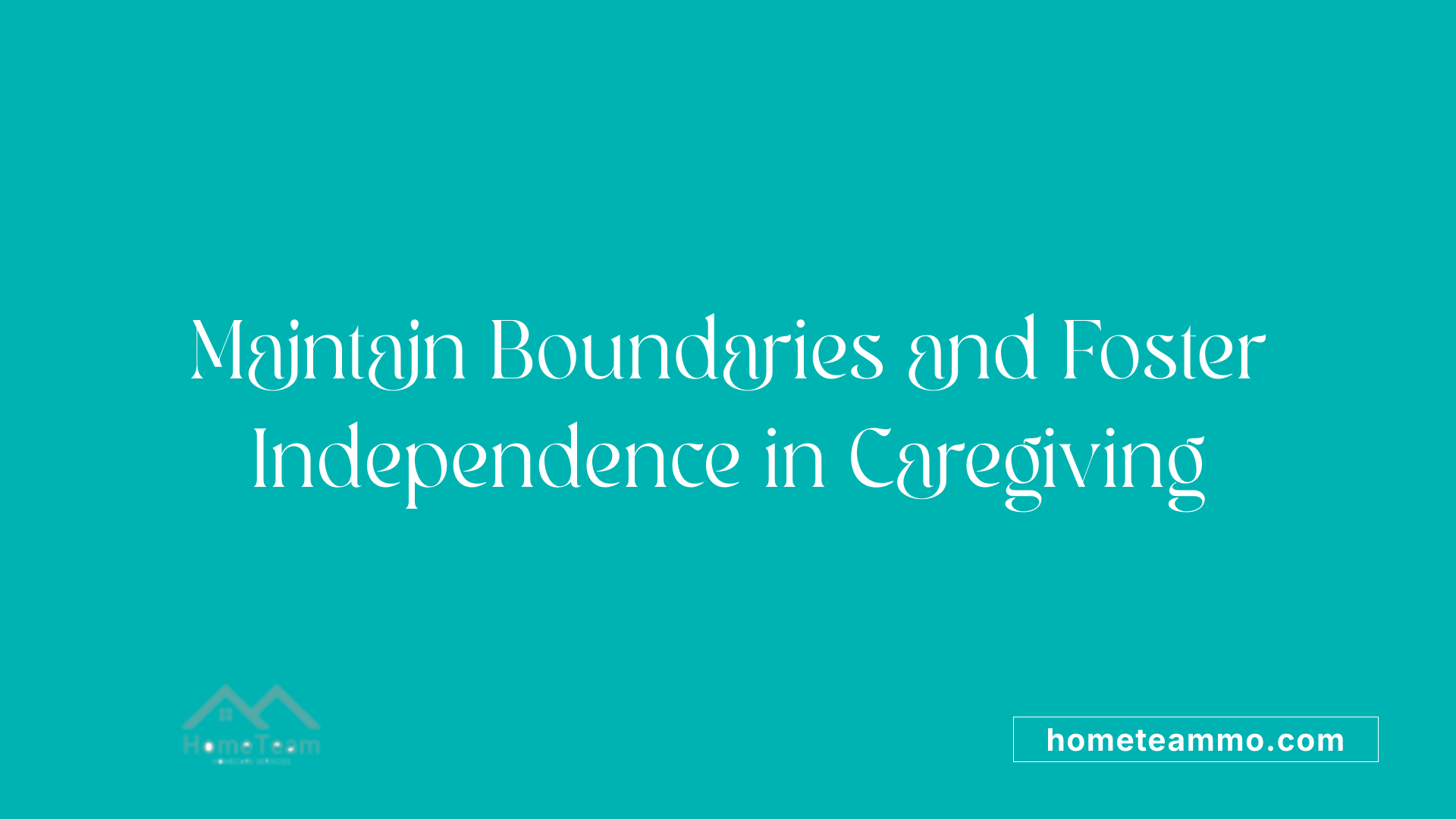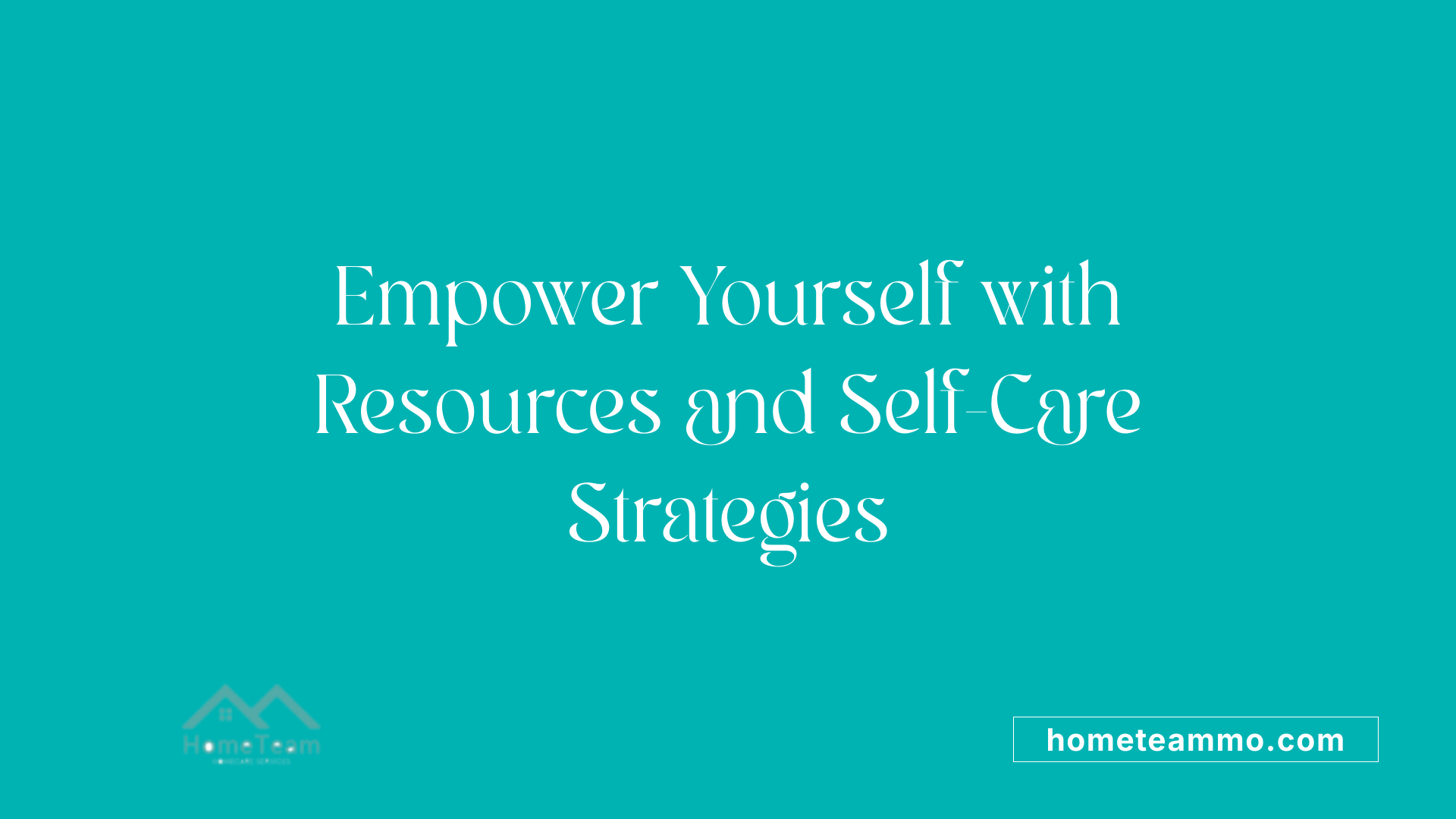How to Address Common Challenges in Caregiving Relationships
Strengthening Bonds Through Effective Caregiving Strategies

Understanding and Navigating Caregiving Complexities
Caregiving relationships are vital yet challenging, requiring a delicate balance of emotional resilience, effective communication, and boundary management. This article explores how caregivers can address common obstacles, maintain their well-being, and foster healthier, more supportive relationships with loved ones.
Recognizing Common Challenges in Caregiving

What are common challenges faced by caregivers?
Caregivers encounter a wide range of obstacles that can significantly impact their physical, emotional, and financial well-being. Physically, caregivers often face risks such as fatigue, injuries from physically demanding tasks like lifting or transferring patients, and a weakened immune system due to stress and exhaustion. These physical strains can lead to chronic health issues, requiring increased healthcare interventions.
Emotionally, caregivers frequently deal with high levels of stress, anxiety, depression, and burnout. Feelings of guilt, helplessness, and frustration are common, particularly when caregiving tasks become overwhelming or when they feel unprepared. The emotional toll is compounded by relational challenges, including family conflicts about care roles, lack of support, and the emotional impact of witnessing loved ones’ decline.
Financial burdens are another major hurdle. Many caregivers face significant expenses, including medical supplies, home modifications for safety, and costs associated with professional assistance. Additionally, caregiving responsibilities can lead to loss of income due to reduced work hours or unemployment, creating economic instability and adding stress.
Communication difficulties and complex family dynamics further complicate caregiving roles. These may involve disagreements over care decisions, misunderstandings, and conflicts about boundaries and responsibilities. In some cases, family disagreements threaten the harmony of caregiving relationships and the quality of care provided.
Access to resources and support systems remains a persistent challenge. Many caregivers are unaware of available services such as respite care, financial aid, and community programs, or face barriers like transportation or eligibility issues, which hinder their ability to seek help.
What emotional and relational challenges are involved?
The emotional aspect of caregiving often entails feelings of guilt, frustration, sadness, and isolation. Many caregivers experience ambivalence about their role, balancing love and duty with feelings of being overwhelmed or resentful. These emotions can lead to depression and anxiety, affecting both mental and physical health.
Relationship strains are common, especially as caregiving responsibilities can alter family roles and increase tensions. Caregivers may struggle with conflicts regarding decision-making, boundaries, and priorities. Witnessing decline or behavioral changes in loved ones can evoke grief and emotional distress.
Effective communication and maintaining personal boundaries are essential but can be difficult to sustain amid stress. Supporting autonomy, setting limits, and fostering open dialogue can help preserve relationships and promote mutual understanding.
Despite these hurdles, many caregivers find the process meaningful. Engaging in stress reduction techniques, seeking social support, and accessing professional mental health services can bolster emotional resilience and help maintain healthy relationships.
How can caregivers manage these challenges?
Proactively seeking support is vital. Joining caregiver support groups provides a platform for sharing experiences and gaining emotional relief. Utilizing respite services offers necessary breaks, preventing burnout.
Developing strong communication skills, including active listening and clear boundary-setting, helps improve family dynamics. Keep open lines of communication about care decisions and expectations to avoid misunderstandings.
On a practical level, managing finances by tracking expenses and separating personal and caregiving funds ensures better financial stability. Accessing available resources such as Medicaid, Supplemental Security Income (SSI), and community-based services can ease financial strain.
In terms of physical health, prioritizing sleep, nutrition, and regular exercise can help mitigate fatigue and prevent illness. Delegating physically demanding tasks or seeking professional help reduces injury risk.
Mental health should not be overlooked. Regularly monitoring symptoms of depression or anxiety and seeking counseling when needed can promote emotional well-being.
What are the implications for policy and community support?
Supporting caregivers requires comprehensive strategies, including increased awareness, education, and accessible services. Community programs, caregiver training, and policy initiatives like paid family leave can alleviate some burdens.
Healthcare professionals play a crucial role by assessing caregiver needs, providing education, and connecting families to vital resources. Developing tailored interventions that address both caregiving and personal health ensures more sustainable care.
Overall, recognizing these common challenges enables caregivers, families, and policymakers to work collaboratively toward solutions that enhance the well-being of caregivers and those they serve. Addressing these issues proactively can improve the quality of care and reduce the risk of physical and emotional distress.
| Challenge Area | Specific Issues | Supporting Strategies |
|---|---|---|
| Physical Health Risks | Fatigue, injury, compromised immunity | Proper ergonomics, delegation, health monitoring |
| Mental Health | Depression, anxiety, burnout | Support groups, counseling, stress management techniques |
| Financial Burdens | Medical expenses, home modifications, income loss | Budgeting, accessing aid programs, financial planning |
| Communication & Family Dynamics | Conflicts, misunderstandings, role reversals | Open dialogue, family meetings, mediation |
| Resource Accessibility | Lack of awareness, eligibility barriers | Education programs, community outreach, advocacy |
This comprehensive overview highlights the multifaceted challenges caregivers face and underscores the importance of strategic support across physical, emotional, financial, and social domains.
Addressing Emotional and Physical Well-Being
Why is it important for caregivers to prioritize sleep, nutrition, and exercise?
Maintaining good physical health is essential for caregivers to manage the physical demands of their role. Sleep, a critical component, helps reduce fatigue and bolster the immune system. Proper nutrition provides the energy needed for daily tasks and mental clarity. Regular exercise not only boosts physical stamina but also supports mental health by releasing endorphins that improve mood.
Caregivers often experience fatigue and health decline due to neglecting their own needs. Prioritizing these areas helps prevent burnout, reduces susceptibility to illness, and improves resilience.
How does giving oneself downtime and focusing on positive thoughts aid in handling emotional challenges?
Caregiving is emotionally taxing, with many facing sadness, depression, or guilt. Allocating time for rest and relaxation allows caregivers to recharge and maintain emotional balance.
Focusing on positives, such as small victories or moments of connection, can foster a more hopeful outlook. Practices like gratitude journaling, mindfulness, or engaging in hobbies promote emotional well-being. These strategies can buffer against feelings of hopelessness and provide necessary mental breaks.
How can caregivers recognize signs of burnout and compassion fatigue early?
Burnout manifests as persistent exhaustion, irritability, decreased motivation, and feelings of being overwhelmed. Compassion fatigue, often experienced by those providing intense emotional support, leads to emotional numbness and overuse of empathy.
Early signs include sleep disturbances, mood swings, withdrawal from social activities, and declining physical health.
Being vigilant about these symptoms and seeking support promptly can prevent severe mental health issues. Regular self-assessment, maintaining open communication among family members, and utilizing caregiver support groups are effective measures.
What effects does caregiving have on caregivers' mental and social well-being?
Caregiving can significantly impact mental health, leading to heightened stress, anxiety, depression, and feelings of social isolation. The responsibilities often lead to reduced social interactions, causing feelings of loneliness.
Physically, caregivers may suffer from fatigue, sleep problems, and increased risk of chronic illnesses due to sustained stress and neglecting personal health.
Despite challenges, some caregivers find positive growth, increased confidence, and stronger bonds with their loved ones. Nevertheless, without adequate support, the psychological and social toll can be profound, emphasizing the need for interventions aimed at preserving caregivers' overall health.
How can caregivers handle emotional strain and relational tension?
First, acknowledging a full range of feelings allows caregivers to process their emotions healthily. Support networks such as peer groups, professional counseling, or family can provide validation and advice.
Prioritizing self-care—through regular exercise, healthy eating, and sufficient rest—builds resilience. Delegating tasks and establishing routines can reduce daily stress.
Utilizing respite care services offers caregivers temporary relief, preventing exhaustion.
Effective communication is also critical; sharing feelings openly with loved ones minimizes misunderstandings and fosters mutual support.
Finally, setting realistic expectations and goals, and avoiding self-criticism, help maintain emotional stability.
| Aspect | Strategies | Details |
|---|---|---|
| Physical self-care | Sleep, nutritious diet, regular exercise | Prevents physical deterioration and boosts overall vitality |
| Emotional well-being | Support groups, therapy, mindfulness, focusing on positives | Enhances mental resilience and reduces feelings of loneliness |
| Stress and burnout signs | Monitoring mood, sleep quality, physical symptoms | Early detection allows timely intervention |
| Relational management | Open communication, boundary-setting, shared responsibilities | Maintains healthy relationships and reduces tension |
| Support resources | Respite care, counseling, community organizations | Provides necessary mental and physical relief |
By actively engaging in these strategies, caregivers can better protect both their health and their relationships, ensuring they remain resilient and effective in their role.
Effective Communication and Conflict Resolution

What are effective communication and conflict resolution strategies in caregiving relationships?
Strong communication skills are vital for maintaining healthy caregiver relationships. Active listening, which involves giving full attention to the speaker, clarifying points, and showing understanding, helps build trust. Using empathetic language and respectful dialogue ensures that both caregiver and care recipient feel valued and understood.
Caregivers should provide regular updates about care plans and health status to family members, maintaining transparency and reducing misunderstandings. Respecting the autonomy and cultural beliefs of the care recipient fosters respect and cooperation.
When conflicts emerge, approaching them with calmness and patience is essential. Caregivers can employ conflict resolution techniques such as:
- Using neutral language
- Focusing on common goals
- Prioritizing solutions over blame
- Seeking third-party mediated discussions if necessary
Employing these strategies promotes mutual understanding and cooperation, which are crucial for delivering quality care and preserving family harmony.
How should caregivers handle the emotional strain and relational tension that come with caregiving?
Caring for a loved one can evoke a variety of emotions, including guilt, sadness, frustration, and exhaustion. Recognizing and accepting these feelings as normal is a first step toward emotional well-being. It’s important for caregivers to have outlets for support, such as joining caregiver support groups or confiding in trusted friends or professionals.
Prioritizing self-care activities like regular exercise, adequate sleep, and healthy eating helps strengthen resilience against stress. Setting attainable goals and breaking tasks into manageable steps can prevent feelings of being overwhelmed.
Delegating caregiving responsibilities to other family members or professional services through respite care options can provide needed breaks. Options include in-home aides, adult day programs, or temporary residential care.
Maintaining routines and boundaries helps manage stress and avoid burnout. Recognizing signs of emotional strain early—such as persistent fatigue, irritability, changes in sleep or appetite—is crucial for seeking timely help.
Finally, caregivers should avoid self-criticism regarding their emotional responses and limitations. Seeking support, practicing self-compassion, and maintaining open communication with loved ones foster emotional health and strengthen relational bonds.
| Aspect | Strategy | Details |
|---|---|---|
| Communication | Active listening | Giving full attention, clarifying, demonstrating understanding |
| Conflict Resolution | Calm approach | Avoiding blame, neutral language, focusing on solutions |
| Emotional Care | Support networks | Joining groups, seeking professional help |
| Self-Care | Routine activities | Exercise, sleep, nutrition |
| Respite | External help | In-home services, adult day care, temporary residential care |
| Monitoring | Signs of stress | Fatigue, irritability, sleep disturbances |
This comprehensive approach ensures that caregivers can foster positive, respectful relationships while maintaining their own mental and physical health amidst the challenges of caregiving.
Strategies for Maintaining Boundaries and Promoting Independence

How can caregivers maintain boundaries and promote independence for care recipients?
Maintaining healthy boundaries while supporting independence is crucial for both caregivers and care recipients. A proactive approach begins with establishing clear roles and responsibilities from the start. Early discussions about what tasks each person will handle set expectations and reduce potential conflicts.
Respectful and open communication is essential. Caregivers should express their boundaries kindly and firmly, ensuring that care recipients understand their limits without feeling dismissed. This involves actively listening to the care recipient’s preferences and encouraging participation in decisions about their care, which fosters a sense of autonomy and dignity.
Encouragement of involvement in decision-making is vital. Care recipients should be empowered to manage tasks they are capable of, whether it's choosing their clothing or managing medication schedules. Giving them the space to do so helps maintain their independence and boosts confidence.
Supporting independence isn’t solely about verbal encouragement. Practical tools like assistive devices—canes, walkers, or grab bars—and technology, such as medication reminder apps or voice-activated assistants, can significantly enhance their ability to perform daily activities without compromising boundaries.
Physical, emotional, and time boundaries also protect everyone’s well-being. For example, setting specific hours for caregiving activities helps preserve personal time, while privately establishing spaces where the care recipient can spend time alone supports emotional boundaries.
Consistently reinforcing boundaries keeps mutual respect intact. When boundaries are inadvertently crossed, responding respectfully but firmly helps prevent resentment and misunderstandings.
Finally, caregivers should prioritize their own self-care and seek support when necessary. Workshops, caregiver support groups, and respite services provide needed breaks, helping prevent burnout.
Fostering an environment where boundaries are respected and independence is promoted leads to healthier caregiver-care recipient relationships and improved quality of life for all involved.
Fostering Family Cohesion and Managing Disagreements

How can caregivers manage challenging family dynamics and difficult family members?
Managing complex family relationships while caregiving can be demanding. The first step is to prioritize emotional regulation—staying calm and composed during discussions helps prevent escalation. Recognizing that some problematic behaviors may be due to underlying medical conditions like dementia, depression, or physical illnesses is crucial. Approaching these behaviors with empathy and understanding can foster better interactions.
Setting clear boundaries is also important. These boundaries help delineate responsibilities and prevent misunderstandings. Encouraging social engagement among family members and validating each person’s feelings can de-escalate conflicts.
External support plays a vital role. Resources like counseling, caregiver support groups, or mental health professionals can provide strategies to manage stress and maintain well-being. Patience, medical understanding, effective communication, and self-care are essential tools caregivers can employ to navigate difficult family situations.
What are effective tools and practices for addressing family disagreements?
Dealing with disagreements requires establishing a foundation of honest and respectful communication. Regular family meetings are an effective way to share updates, express concerns, and coordinate care plans. These meetings should be structured to allow everyone to voice their thoughts in a safe environment.
Approach conflicts with empathy and neutrality, focusing on the best interests of the care recipient. Techniques like active listening, where each person’s concerns are repeated and acknowledged, help validate feelings and reduce tension.
If disagreements become entrenched or emotional, seeking outside help such as mediators or family therapists can facilitate compromise. Transparent sharing of information regarding care decisions builds trust among family members.
Addressing emotional and financial concerns openly, acknowledging each person’s contributions, and emphasizing shared goals foster a collaborative atmosphere. Ultimately, fostering open dialogue, mutual support, and patience helps sustain a harmonious caregiving environment.
How does open communication contribute to family harmony?
Open and honest communication is the backbone of effective caregiving within families. When family members are kept informed and involved, misunderstandings are minimized, and trust is strengthened.
Regularly scheduled family meetings and updates provide platforms for discussing care plans, addressing concerns, and setting expectations. These practices ensure everyone feels heard and valued.
Employing active listening and neutral language during discussions helps prevent blame and promotes cooperation. When conflicts arise, approaching them with empathy and focusing on solutions rather than problems can de-escalate tensions.
Seeking external support, such as counseling or mediation, shows a commitment to resolving issues constructively. Recognizing each family member’s role and contribution fosters respect and collaboration.
Understanding underlying family dynamics, including pre-existing tensions or communication styles, allows for tailored approaches to dispute resolution. Maintaining transparency and emphasizing shared priorities, such as the well-being of the loved one, promotes a cohesive caregiving environment.
How can outside support and mediation help in family conflicts?
External support options are valuable tools to mediate conflicts and improve family dynamics. Professional mediators or therapists can facilitate open discussions, helping family members articulate their concerns and listen actively.
Counseling can address underlying emotional issues, facilitate better understanding, and develop conflict resolution skills. Family support groups provide shared experiences and advice from others facing similar challenges.
Legal and care planning professionals can clarify responsibilities, estates, and care decisions, reducing uncertainties and misunderstandings.
Using external support demonstrates a proactive approach to maintaining family harmony. It can prevent conflicts from escalating, ensure that everyone’s perspectives are acknowledged respectfully, and help develop practical, mutually agreeable solutions.
By combining consistent, honest communication with external mediators and support systems, caregivers and family members can create a more cooperative and less stressful caregiving environment.
Supporting Caregivers Through Resources and Self-Care

What resources are available to help caregivers manage their responsibilities?
Caregiving can be demanding, both physically and emotionally. Fortunately, numerous resources are available to help caregivers cope with these challenges and maintain their well-being.
Support groups, whether in person or online, serve as vital emotional outlets. They provide a platform for caregivers to share experiences, gain advice, and find reassurance from others who understand their situation. These groups can be local community-based or connected through national organizations such as the Caregiver Action Network.
Respite care is another crucial resource offering temporary relief from caregiving duties. It includes in-home assistance, adult day care centers, and short-term stays in nursing homes. These services allow caregivers to take necessary breaks to rest, run errands, or tend to personal health needs without guilt or stress.
Technology also plays an important role. Caregiving apps and online calendars help organize daily tasks, medication schedules, appointments, and track medical information. These digital tools streamline communication and ensure that all involved parties are on the same page, reducing confusion and oversight.
Seeking professional support is equally significant. Healthcare providers, including nurses and geriatric care managers, can offer tailored advice, care planning, and emotional support. Counseling or therapy sessions provide a safe space for caregivers to address feelings of stress, anxiety, grief, or depression.
Organizations such as the Eldercare Locator or the Family Caregiver Alliance are dedicated to connecting caregivers with local services, resources, and educational programs. These agencies serve as comprehensive starting points for understanding available options and securing assistance.
Proactively utilizing these resources not only relieves immediate burdens but also contributes to long-term well-being. It helps caregivers manage responsibilities effectively, reduces feelings of isolation, and maintains the quality of care provided to loved ones.
How can caregivers effectively access community and online support?
Engaging with both community and digital resources ensures a broad support network. Start by reaching out to local senior centers, faith-based organizations, or health clinics that often host caregiver support groups and educational workshops.
Online platforms such as caregiver forums, social media groups, and dedicated websites offer additional avenues for connection. These virtual communities allow caregivers to share tips, ask questions, and receive emotional support at any time.
Registering with organizations like the Caregiver Action Network or visiting websites like the Eldercare Locator can help locate nearby services and events. Many agencies also provide educational materials and webinars that strengthen caregiving skills and knowledge.
How do respite care options help prevent caregiver burnout?
Respite care provides essential breaks, ensuring caregivers do not become overwhelmed. Whether through in-home care services, adult day programs, or short-term residential care, these options give caregivers time for self-care, appointments, or simply rest.
This relief reduces stress and emotional exhaustion, key factors in preventing burnout. Regularly scheduled respite allows caregivers to maintain their health, pursue personal interests, and preserve relationships.
What role do caregiving tools play in effective management?
Technology tools facilitate organization and communication. Apps like CaringBridge, Medisafe, or Care Zone can track medications, appointments, and health records. Online calendars, especially shared ones, help coordinate schedules among family members and care providers.
These tools minimize errors, streamline communication, and save time, making caregiving tasks more manageable. They also help ensure nothing falls through the cracks, which is vital in complex care situations.
Why is seeking professional support important?
Caregivers often experience mental health challenges such as anxiety, depression, or feelings of guilt. Counseling and therapy can address these issues, offering coping strategies and emotional resilience.
Healthcare professionals, including nurses and geriatric care managers, can assist in developing personalized care plans, provide medical guidance, and help navigate complex healthcare systems. Their expertise ensures that both caregivers and care recipients’ needs are adequately met.
How organizations like the Eldercare Locator and Caregiver Action Network assist caregivers?
These organizations serve as comprehensive sources of information and support. The Eldercare Locator connects caregivers to local services like transportation, home care, and legal assistance. The Caregiver Action Network offers resources, training, advocacy, and support groups.
Accessing these organizations enables caregivers to build a network of support, learn about available programs, and improve their caregiving skills. They advocate for caregiver rights and help ensure access to necessary resources.
Summary Table of Resources and Strategies
| Resource or Support Type | Examples | Benefits | Additional Notes |
|---|---|---|---|
| Support Groups | Local community groups, online forums | Emotional support, shared experiences | Connect with others, reduce loneliness |
| Respite Care | In-home services, adult day centers, short-term stays | Physical and emotional relief | Schedule regularly to avoid burnout |
| Technology Tools | Caregiving apps, online calendars | Task management, communication | Use to stay organized and informed |
| Professional Services | Counseling, healthcare providers, care managers | Emotional health, personalized plans | Seek help early for best outcomes |
| Organizations | Eldercare Locator, Caregiver Action Network | Resources, local services, advocacy | Use as starting point for support |
Proactively accessing these tools and support systems helps caregivers sustain their health, provide quality care, and maintain their personal well-being. The combination of community engagement, technological aid, and professional assistance offers a comprehensive approach to managing caregiving responsibilities effectively.
Building Resilience and Ensuring Sustainability in Caregiving
How can caregivers prevent burnout and promote sustainable caregiving?
Caregiving is a demanding role that can take a toll on both physical and mental health. To maintain their well-being over the long term, caregivers need to adopt strategies that foster resilience and sustainability.
One of the most effective approaches is creating structured routines and daily schedules. These help manage responsibilities systematically, reducing uncertainty and stress. For example, setting specific times for medication administration, meals, and rest can streamline caregiving tasks and create predictability.
Prioritizing self-care activities such as regular exercise, healthy eating, adequate sleep, and hobbies is essential. These activities serve as energy boosters that counteract fatigue and emotional exhaustion. Even short breaks or engaging in relaxing activities like meditation or deep-breathing exercises can significantly improve mood and resilience.
Seeking outside professional support plays a vital role. Counseling services offer emotional relief, while caregiver training programs enhance skills and boost confidence. Connecting with peer support groups can also provide comfort, shared advice, and understanding from others facing similar challenges.
Preparing for emergencies is another important step. Developing a comprehensive crisis plan ensures caregivers know what to do in unexpected situations, which helps reduce anxiety and chaos during urgent moments. This plan should specify contacts for emergency assistance, backup caregiving options, and vital medical information.
Sharing responsibilities with family members and leveraging community resources help distribute workload fairly. This prevents over-reliance on a single individual and fosters a sense of collaboration, making caregiving more sustainable.
Enhancing emotional strength is achievable through mindfulness practices, relaxation techniques, and resilience-building activities. Meditation and deep breathing can calm the mind, while activities such as journaling or attending therapy sessions help process complex emotions.
By integrating these practices—structured routines, self-care, professional engagement, emergency preparedness, shared responsibilities, and resilience exercises—caregivers can promote a sustainable, balanced approach. This comprehensive strategy supports their health, preserves their capacity to provide quality care, and contributes to their overall longevity in the caregiving role.
Fostering a Supportive and Balanced Caregiving Relationship
Addressing the multifaceted challenges of caregiving requires a proactive approach that encompasses physical health, emotional resilience, effective communication, and strategic boundary-setting. By accessing available resources, fostering open dialogue, and prioritizing self-care, caregivers can not only improve their own well-being but also enhance the quality of care they provide. The foundation of a healthy caregiving relationship is built on mutual respect, trust, and ongoing support, enabling caregivers to navigate difficulties with confidence and compassion. Ultimately, strengthening caregiver relationships contributes to better outcomes for both caregivers and care recipients, ensuring a sustainable and fulfilling caregiving experience.
References
- Solutions for Nine Common Caregiving Challenges
- Common Caregiving Problems - American Psychological Association
- 5 Common Challenges in Caregiving and How to Address Them
- How Caregivers Can Protect Their Relationship With a Loved One
- Addressing Common Senior-Caregiver Relationship Concerns
- Supporting Family Caregivers in Providing Care - NCBI
- Keeping Your Personal Relationships Strong While Caregiving
- Caregiver stress: Tips for taking care of yourself - Mayo Clinic
- Dealing With Common Family Conflicts as a Caregiver - AARP

How to Plan for Long-Term Home Care Services

How Home Team Helps Families Make Informed Care Decisions

How Home Team's Caregivers Provide Peace of Mind for Families



